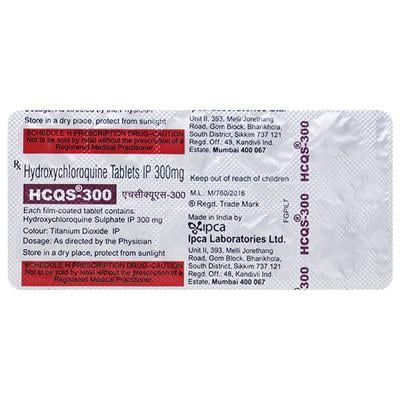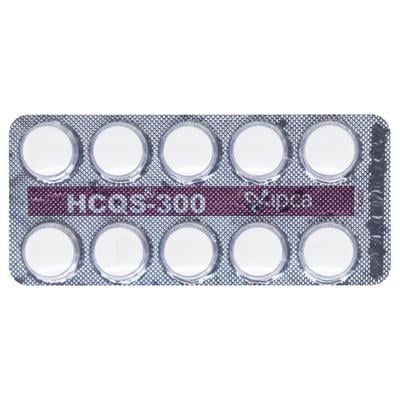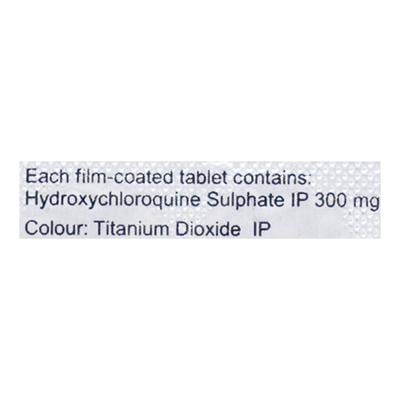

Netmeds First Membership
Quick Links
Introduction About HCQS 300MG TABLET
HCQS 300MG TABLET contains Hydroxychloroquine which belongs to the group of medicines called Antimalarials or Disease-Modifying Anti-Rheumatic Drugs (DMARDs). It is used to manage malarial infection. Malaria is a parasitic infection caused by the plasmodium parasite, which spreads in blood by the bite of an infectious mosquito. It is characterized by symptoms such as fever, chills, sweating, headache, nausea, vomiting, body pain and general discomfort. It is also used to manage rheumatoid arthritis, discoid and systemic lupus erythematosus in adults and manages juvenile idiopathic arthritis in children. Also, it is used to manage skin problems (which are sensitive to sunlight). It is used in patients with type 2 diabetes mellitus as an adjunct to diet and exercise to improve glycemic control of patients on metformin and sulfonylurea combination.
Rheumatoid arthritis, discoid and systemic lupus erythematosus is an inflammatory autoimmune condition in which the immune system attacks its own body cells. It is generalized by symptoms such as painful swelling, stiffness, swelling, tenderness or weakness of bone joints, weakness, fever, skin rashes and anemia. HCQS 300MG TABLET is not recommended for use in patients with maculopathy or retinal disorder of the eye and changes in eye color, etc. Your doctor may recommend you to take relevant tests to understand your existing condition.
Before taking HCQS 300MG TABLET inform your doctor if you have heart disease, psoriasis or porphyria, blood disorders (such as aplastic anemia, agranulocytosis, leukopenia or thrombocytopenia) glucose-6-phosphate dehydrogenase (G6PD) deficiency, psychological disorders, abnormal blood sugar levels. HCQS 300MG TABLET should be used with caution in pregnant and breastfeeding women only if advised by the doctor. HCQS 300MG TABLET should be used with caution in children and elderly patients (aged 65 years and above). The most common side effects of taking HCQS 300MG TABLET are nausea, vomiting, loose stools, stomach pain, headache, loss of appetite and skin rashes. Consult your doctor if any of the side effects worsen.
Uses Of HCQS 300MG TABLET
- Manages malarial infection in adults and children
- Manage rheumatoid arthritis, discoid and systemic lupus erythematosus
- Manage skin problems (which are sensitive to sunlight)
- Manage juvenile idiopathic arthritis
- Used in patients with type 2 diabetes mellitus to improve glycemic control
How HCQS 300MG TABLET Works
HCQS 300MG TABLET works by increasing the potential of Hydrogen (pH) in a cell which disrupts the survival of infectious organisms and it also decreases the release of inflammatory enzymes. As a result, HCQS 300MG TABLET manages malarial infections in children and adults, it also manages rheumatoid arthritis and lupus erythematosus in adults.
How to use HCQS 300MG TABLET
Always take HCQS 300MG TABLET as directed by your physician. Swallow the medicine as a whole with a glass of water and do not crush or chew the medicine. Your doctor will decide the correct dose, duration and frequency for you depending upon your age, body weight and disease conditions.
Side Effects Of HCQS 300MG TABLET
Common
- Nausea
- vomiting
- Diarrhea
- Stomach pain
- Headache
- Loss of appetite
- Skin rashes or itching
- Mood swings with uncontrollable laughing or crying
Uncommon
- Changes in the color of the skin, nose, mouth or hair
- Dizziness
- Hair loss
- Decreased reflexes
- Vertigo (spinning sensation)
- Ringing in the ears
Stop taking HCQS 300MG TABLET and contact your doctor immediately if you experience any of the following side effects:
- Severe allergic reactions (such as skin rash, redness, itching, swallowing or breathing problems, swelling of your lips, face, throat or tongue)
- Blistering of the skin, particularly the mouth, face, nose and genitals, fever and flu-like symptoms such as eosinophilia and systemic symptoms (DRESS), stevens-johnson syndrome
- Lowering of the blood glucose level
- Muscle weakness, muscle spasms or cramps, or changes in sensation of your skin (tingling)
- Eye problems (changes in color of the eye, blurring vision, sensitivity to light)
- Weakening of the heart muscle, chest pain, an irregular or abnormal heartbeat, feeling dizzy or tired, swelling of feet, ankles and legs
- Abnormal bleeding or bruising, tiredness and pale skin
- Recurrent infection such as sore throat, mouth ulcers and fever
- Muscle stiffness, abnormal movements or shivering of body parts
- Altered behavior
How To Manage Side Effects
Loss Of Appetite
Eat when you are hungry. Eat smaller meals more often than usual. Snack only when you're hungry. Eat a nutritious snack that is rich in calories and protein, such as dried fruit and nuts. Consult your doctor immediately if the symptoms worsen or persist.
Nausea And Vomiting
Stick to simple meals while taking this medicine. Avoid eating oily rich, fried or spicy foods. Do not lie down or sleep immediately after eating. Consult your doctor if the symptom does not improve.
Skin rash Or Itching
Avoid hot showers because hot water can irritate your skin further. Do not scratch the affected area. Use protective clothing when going outdoors. Regularly moisturize your skin. Consult your doctor if the symptom worsens.
Stomach Pain
Try to rest and relax. Eat and drink slowly or try to have smaller meals more frequently. Keep a heat pad on your stomach. If the symptom does not improve, consult your doctor.
Warning & Precautions
Pregnancy
Use with CautionHCQS 300MG TABLET should be used with caution in pregnant women if recommended by your doctor. Inform your doctor immediately if you become pregnant or think you may be pregnant while taking HCQS 300MG TABLET.
Breastfeeding
Use with CautionHCQS 300MG TABLET should be used with caution in breastfeeding women only if recommended by your doctor as it can pass through the breast milk. Consult your doctor before taking HCQS 300MG TABLET.
Driving and Using Machines
Use with CautionDo not drive or operate any machines if you experience blurred vision or any eye problems while taking HCQS 300MG TABLET.
Kidney
Use with CautionHCQS 300MG TABLET should be taken with caution in patients with kidneys problems. Consult your doctor before taking HCQS 300MG TABLET.
Liver
Use with CautionHCQS 300MG TABLET should be taken with caution in patients with liver problems. Consult your doctor for advice before taking HCQS 300MG TABLET.
Allergy
ContraindicatedDo not take HCQS 300MG TABLET if you are allergic to Hydroxychloroquine, similar medicines such as quinolones (Ex. chloroquine) and quinine or any other ingredients of this medicine.
Heart Disease
Use with CautionHCQS 300MG TABLET should be taken with caution in patients with heart disease (such as cardiomyopathy, abnormal heartbeat, long QT syndrome) or have a history of heart attack. Consult your doctor before taking HCQS 300MG TABLET.
Use In Pediatrics
Use with CautionHCQS 300MG TABLET should be used with caution in children. Your child’s doctor will decide the dose, duration of management and its frequency depending upon the child’s age, body weight, severities of disease and other disease conditions.
Use In Geriatrics
Use with CautionHCQS 300MG TABLET should be taken with caution in elderly patients (aged 65 years and above). Consult your doctor before taking HCQS 300MG TABLET.
Others
HCQS 300MG TABLET is not recommended for use if you:
- Have an eye problem which affects the retina (maculopathy)
- Experience change in eye color or any other problem
Before taking HCQS 300MG TABLET, inform your physician if you:
- Have abnormal blood sugar levels
- Have glucose-6-phosphate dehydrogenase (G6PD) deficiency or porphyria
- Have psoriasis
- Have a blood disorder such as aplastic anemia, agranulocytosis, leukopenia or thrombocytopenia
- Have any problems with nervous system or brain
- Have serious stomach or gut problems
- Have a psychological disorder such as mood swings or suicidal behaviors
- Had a bad reaction to quinine in the past
Interactions
A. Drug-Drug interactions:
Before taking HCQS 300MG TABLET, inform your doctor if you are taking any of the following medicines:
- Insulin, sulfonylureas such as glimepiride, meglitinide, thiazolidinedione such as pioglitazone, metformin (used to manage diabetes)
- Digoxin, amiodarone (used to manage heart disease)
- Azithromycin, clarithromycin, erythromycin, gentamicin, neomycin, tobramycin and moxifloxacin (used to manage bacterial infections)
- Cimetidine (used to manage stomach ulcers)
- Neostigmine and pyridostigmine (used to manage myasthenia gravis and muscle weakness)
- Tamoxifen (used to manage eye infections)
- Halofantrine, mefloquine (used to manage malarial infection)
- Amisulpride, quetiapine, risperidone (used to manage psychiatric disorders)
- Rabies vaccine (used to manage rabies)
- Ciclosporin (used to manage organ transplant rejection)
- Praziquantel (used to manage worm infections)
- Agalsidase (used to manage fabry’s disease)
- Carbamazepine, sodium valproate, topiramate (used to manage fits or seizures)
Overdosage:
If you or anyone else accidentally takes more of HCQS 300MG TABLET, consult your doctor immediately or visit a nearby hospital immediately if the symptoms worsen. The symptoms may include abnormal or low blood pressure, low potassium levels in the blood, abnormal heartbeat, depression, seizures, impaired vision, transient blindness, cardiac arrest, coma or death.
Synopsis
| Drug | : | Hydroxychloroquine |
| Pharmacological Category | : | Antimalarials or Disease Modifying Anti-Rheumatic Drugs |
| Therapeutic Indication | : | To manage malaria, rheumatoid arthritis, juvenile idiopathic arthritis, discoid and systemic lupus erythematosus, skin problems |
| Dosage Forms | : | Tablet, Cream |
More Information
Storage
- Keep HCQS 300MG TABLET out of reach of children
- Store at room temperature
FAQs About HCQS 300MG TABLET
Q: Can HCQS 300MG TABLET be used during pregnancy?
A: HCQS 300MG TABLET should be used with caution in pregnant women only if advised by the doctor. Consult your doctor for advice before taking HCQS 300MG TABLET. Inform your doctor if you are planning or doubt if you are pregnant.
Q: What are the common side effects of HCQS 300MG TABLET?
A: The most common side effects of taking HCQS 300MG TABLET are nausea, vomiting, loose stools, stomach pain, headache, loss of appetite and skin rashes. Consult your doctor if any of the side effects worsen.
Q: Is HCQS 300MG TABLET safe for use in patients with diabetes?
A: HCQS 300MG TABLET should be used with caution in patients with diabetes. Inform your doctor if you have diabetes and taking medicines to manage the condition such as insulin, sulfonylureas such as glimepiride, meglitinide, thiazolidinediones such as pioglitazone, metformin, etc. HCQS 300MG TABLET can lower the blood sugar levels. Consult your doctor if the symptoms worsen or persist.
Q: Can I stop taking HCQS 300MG TABLET if my symptoms of the disease subside?
A: Though the symptoms of your disease subside, do not stop taking HCQS 300MG TABLET unless recommended by your doctor as the disease and its symptoms may worsen back again. Consult your doctor for advice.
Q: What happens when you forget to take HCQS 300MG TABLET?
A: If you forget to take a dose of HCQS 300MG TABLET on time, take it as soon as you remember. However, skip the missing dose if it’s time for the next dose. Do not take a double dose to make up for a missed dose.
References
1. KD. Tripathi. Anti-Rheumatoid and antigout drugs. Essentials of medical pharmacology. 8th edition. 2019. Page – 229.
2. Armaan M Nazir, Bhavya Koganti, Kunal Gupta, Marrium S Memon, Muhammad Bin Aslam Zahid, Vignarth Shantha Kumar, Mamatha Tappiti, and Jihan A Mostafa. NIH National Library of Medicine, National center for biotechnology information. Evaluating the Use of Hydroxychloroquine in Treating Patients with Rheumatoid Arthritis. [Revised in Novemebr 2021] [Accessed on 8th July 2022] https://www.ncbi.nlm.nih.gov/pmc/articles/PMC8575345/
3. Bethesda (MD). NIH National Library of Medicine, National center for biotechnology information. Hydroxychloroquine. [Revised in April 2021] [Accessed on 8th July 2022] https://www.ncbi.nlm.nih.gov/books/NBK548738/
4. Zentiva Pharma UK Limited. Electronic Medicines Compendium (EMC). [Revised in February 2022] [Accessed on 8th July 2022] https://www.medicines.org.uk/emc/files/pil.1764.pdf
5. Blackrock Pharmaceuticals Ltd. Electronic Medicines Compendium (EMC). [Revised in April 2022] [Accessed on 8th July 2022] https://www.medicines.org.uk/emc/files/pil.11732.pdf
6. Novitium Pharma LLC. NIH National Library of Medicine, DailyMed. [Revised in January 2022] [Accessed on 8th July 2022] https://dailymed.nlm.nih.gov/dailymed/fda/fdaDrugXsl.cfm?setid=29dc13a8-b583-4a91-bf0d-6ef8b81bea62&type=display#section-9
7. SPH Zhongxi Pharmaceutical Co. Hydroxychloroquine sulfate 100 mg Tablets. [Revised in January 2022] [Accessed on 8th July 2022] https://en.idtaus.com.au/wp-content/uploads/2020/06/Patient-Information-Leaflet-Hydroxychloroquine-sulfate-20200602.pdf
Useful Diagnostic Tests
- Complete blood count
- Liver function test









